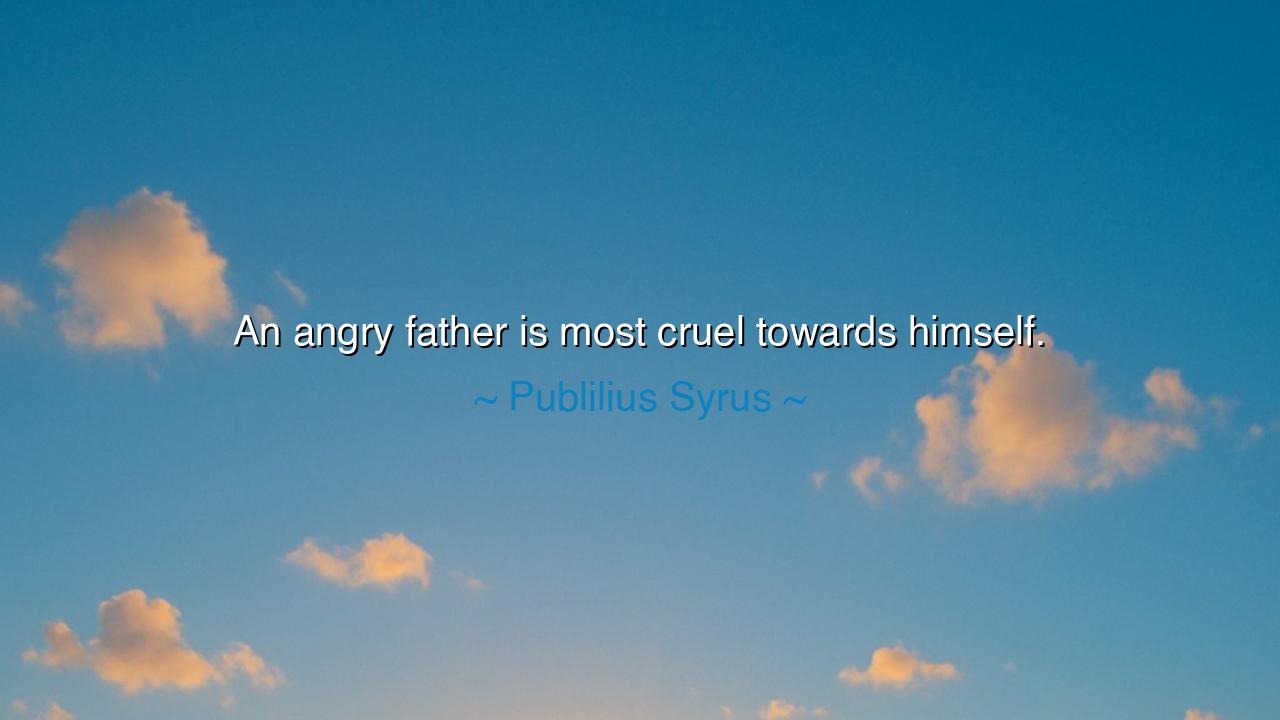
An angry father is most cruel towards himself.






In the voice of Publilius Syrus, the Roman slave who rose to wisdom through the chains of servitude, there resounds an eternal truth: “An angry father is most cruel towards himself.” In this brief but potent saying, the ancient moralist unveils a mystery of the human heart—that anger, when wielded without restraint, wounds the one who bears it most deeply. For the father, who is called to guide, protect, and love, becomes through wrath both judge and executioner of his own peace. His fury, meant to correct others, burns first within his own soul.
In the ancient world, the father was the pillar of the home, the flame that gave both light and warmth. But if that flame turned wild, it could consume the very household it was meant to nurture. Publilius knew well that anger blinds wisdom and poisons love. The father who lashes out in rage may silence his child, but he also silences his own tenderness. His authority remains, but his joy withers. For what is cruelty but misplaced sorrow—a man striking out at what he cannot control? Thus, the angry father, in harming those he loves, destroys his own serenity, becoming a stranger within his own heart.
Consider the story of King Lear, the old monarch of Britain, who divided his kingdom in anger and pride. His daughters’ deceit was born not merely of greed, but of fear—fear of a father whose temper ruled more fiercely than his wisdom. When Lear cast out his one honest daughter, Cordelia, his rage severed the bond that had been his truest source of love. In the lonely madness that followed, he learned too late the truth of Publilius’s words: that his wrath had punished him more than any enemy could. His cruelty toward others had become cruelty toward himself, and his kingdom fell with his peace of mind.
Even beyond royalty and myth, the same truth governs every home and every heart. The father who lets anger master him poisons the soil of his own legacy. His children learn fear instead of respect; his wife learns silence instead of closeness; and he himself learns regret instead of peace. In the stillness after the storm, he looks upon what his fury has broken and finds his own reflection among the ruins. The cruelty of anger is not only in the words it hurls, but in the emptiness it leaves behind—the loss of harmony, the corrosion of love, the grief of knowing one’s own hand caused the wound.
But Publilius does not condemn the father—he warns him. His wisdom is not to shame but to awaken. He tells us that anger must be mastered by compassion, that power must serve love, and that true strength lies in patience. For the father’s role is divine: he mirrors the order of the heavens in his home, balancing justice with mercy, authority with affection. When he speaks with calm, his words take root; when he governs with gentleness, his children flourish. The heart that governs others must first learn to govern itself.
History honors those who have learned this mastery. The great emperor Marcus Aurelius, though burdened by wars and the weight of empire, wrote in his Meditations that “the best revenge is not to be like your enemy.” Though surrounded by turmoil, he ruled his own soul first. His wisdom as a father and ruler came from stillness, not from fury. His greatness was measured not in conquest, but in self-control, in knowing that anger enslaves even kings, while calm frees even the oppressed.
Thus, the teaching of Publilius Syrus is one of profound liberation. An angry father is most cruel towards himself, for he turns his own love into torment. But the father who conquers anger becomes a source of life and peace, both to himself and those he guides. His household becomes a sanctuary, not a battlefield; his heart, a fountain of wisdom rather than wrath. Such a man embodies the highest art of strength—the strength to feel deeply, yet to act with clarity.
So let this be the lesson to all who lead, love, and raise others: guard your temper as you would guard your soul. When anger rises, pause and breathe; remember that your wrath can shape destinies, that your words echo beyond the moment. Choose compassion where rage would rule, and patience where pride would strike. For only then will you find that the truest victory is not over others, but over the tempest within. And in mastering it, you will cease to be cruel to yourself—and instead become a bringer of peace to all who dwell within your care.






AAdministratorAdministrator
Welcome, honored guests. Please leave a comment, we will respond soon